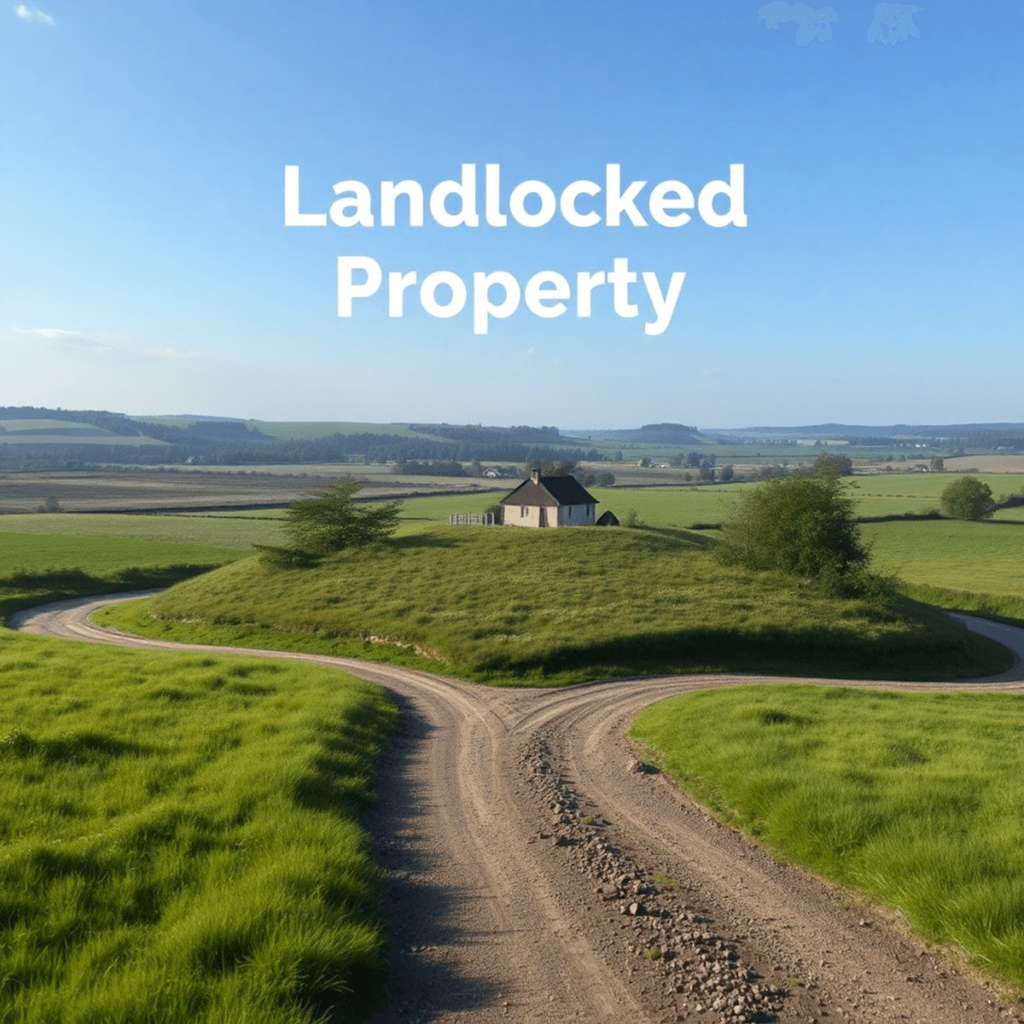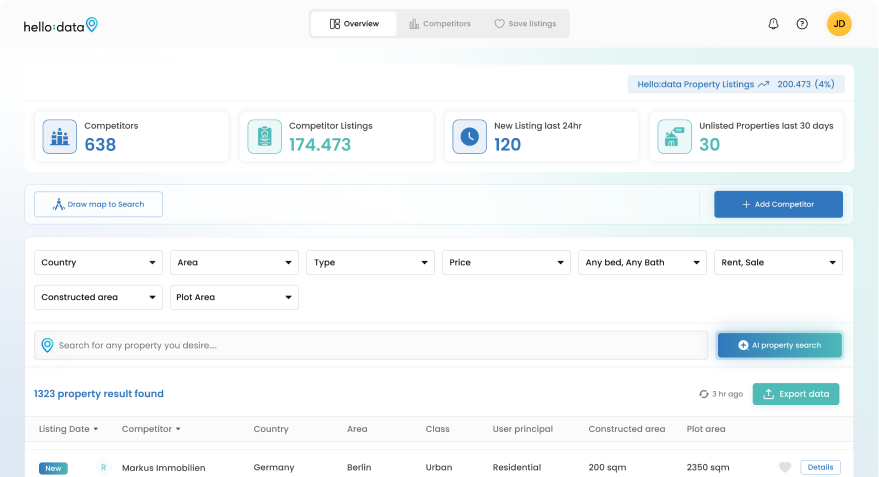Introduction
A landlocked property is a piece of land that doesn’t have direct access to public roads or highways. To get to this property, you would need to go through someone else’s land. This situation often happens when larger pieces of land are divided up, and the individual plots are sold without making sure there are proper access routes.
Understanding what it means to own such a property is important in real estate. Here are the main reasons why it matters:
- Legal Issues: Landlocked properties come with specific legal problems that can make transactions more complicated.
- Possible Difficulties: There may be issues related to easements (the right to cross someone else’s land), financing (getting loans), and disputes with neighbors.
By understanding these complexities, you can make better decisions when buying or selling a landlocked property. Knowledge gives you the power to handle the unique aspects of these real estate transactions effectively.
Understanding Landlocked Properties
A landlocked property is a piece of land that does not have direct access to a public road. To get to this property, you would need to go through neighboring properties. This situation often happens when larger areas of land are divided into smaller sections, which can then be sold individually without making sure each section has its own access.
Key Features of Landlocked Properties
To determine if a property is landlocked, certain features must be present:
- No Direct Access: The property has no immediate route to a public road.
- Dependency on Neighboring Land: Access requires traversing adjacent properties.
- Potential for Easements: Owners may need to seek legal rights to cross neighboring lands.
Common Reasons for Landlocking
Several common reasons can cause a property to become landlocked:
- Subdivision Practices: Developers may create smaller plots without considering future access needs.
- Historical Changes: Alterations in property lines due to sales or inheritance can trap a parcel without access.
- Natural Barriers: Rivers, cliffs, or other geographical features may isolate a property from main roads.
Understanding the definition and implications of what constitutes a landlocked property is crucial for potential buyers and sellers. Recognizing these characteristics helps navigate the complexities inherent in real estate transactions involving such properties.
The Importance of Legal Access in Real Estate Transactions
When dealing with landlocked properties, understanding the significance of legal access becomes paramount. Without direct access to public roads, navigating real estate transactions can be complex. Legal access often hinges on various types of easements that allow property owners to cross neighboring lands.
1. Express Easement: A Direct Approach to Gaining Access
An express easement is a legal agreement that grants a property owner the right to use a specific path or route over another person’s land. This type of easement is usually negotiated directly between landowners and is documented in writing, making it clear and enforceable.
Key Characteristics of an Express Easement:
- Clearly defines the scope and location of the easement.
- Must be agreed upon by both parties involved.
- Typically recorded with local government authorities to ensure future owners are aware of the access rights.
Negotiating an express easement involves several steps:
- Initial Discussion: Open communication with neighboring landowners is vital. This establishes a foundation for negotiation.
- Understanding Needs: Clearly articulate your need for access and how it affects your property use. For example, if you need to reach a public road for essential services, emphasize this point.
- Drafting the Agreement: Once terms are agreed upon, both parties should draft a written document outlining the easement’s specifications. This includes details about maintenance responsibilities and any limitations on use.
- Legal Review: Consulting with a real estate attorney ensures that all legal aspects are covered, protecting both parties’ interests.
- Recording the Easement: After finalizing the agreement, it should be filed with local authorities to become part of public records.
Express easements provide clarity and security for landowners, making them crucial in real estate transactions involving landlocked properties.
Understanding Other Types of Easements
Understanding other types of easements broadens your perspective on accessing landlocked properties:
- Implied Easement: Recognized by law based on circumstances suggesting that access was intended at the time of property division.
- Easement by Necessity: Granted when there is no reasonable alternative for accessing a property, often requiring court intervention.
- Prescriptive Easement: Developed through continuous and uninterrupted use over time without objection from neighbors, which may also require legal validation.
Navigating these legal avenues not only protects your investment but also enhances usability and future resale potential. Engaging in these processes allows you to secure your rights as a property owner while minimizing conflict with neighboring landowners. Understanding how each easement works positions you strategically in real estate dealings involving challenging access situations.
2. Implied Easement: Understanding When This Applies
An implied easement is a legal right that allows access to a landlocked property based on existing circumstances, rather than explicit agreement between property owners. This type of easement may arise in specific situations where:
- Prior Use: If a property has been used in a certain way for an extended period before it became landlocked, the law may recognize an implied easement to maintain that access.
- Necessity: In cases where access is essential for the practical use of the property, an implied easement can be established. For instance, if a piece of land can only be accessed through another’s property and becomes unusable without that access.
- Subdivision Scenarios: When larger tracts are divided into smaller parcels, properties may become landlocked due to the new boundaries. If one parcel relies on another for access, an implied easement might apply.
Understanding these principles is crucial when navigating property ownership issues. The concept of implied easements emphasizes the importance of maintaining legal access to your landlocked property while providing insight into the rights you may have under law. Knowing how these easements work helps in evaluating options for securing necessary access.
3. Easement by Necessity: When Access is Essential for Use
An easement by necessity is a crucial legal tool for landowners facing access issues. This type of easement can be established under specific circumstances, particularly when a property cannot be reasonably accessed without crossing another’s land. Key aspects include:
- Essential Access: If a landlocked property would become unusable without a defined path to a public road, an easement by necessity may be granted.
- Legal Requirements: To obtain this easement, the property owner must demonstrate that:
- The lack of access significantly impairs the use of the property.
- There was historical access from the time of purchase or subdivision.
- Court Involvement: Often, these easements require court intervention to affirm the right to access, especially if negotiations with neighbors fail.
Easements by necessity differ from express or prescriptive easements, as they focus specifically on situations where access is vital for functionality. Recognizing your legal rights concerning easements is essential when navigating the complexities of landlocked properties. Understanding these options empowers you to make informed decisions about accessing and utilizing your real estate effectively.
4. Prescriptive Easement: Acquiring Rights Through Continuous Use
A prescriptive easement is a type of legal access that allows a property owner to gain rights over a neighboring landowner’s property through continuous and uninterrupted use. This concept is particularly relevant for landlocked properties, where gaining access is essential.
Conditions Required for a Prescriptive Easement:
- Continuous Use: The use of the neighbor’s land must be consistent and without interruption for a specified period, typically ranging from 5 to 20 years, depending on state laws.
- Open and Notorious: The use should be visible and apparent, meaning the neighbor is aware that their land is being used for access.
- Adverse Use: The usage must occur without the permission of the neighboring landowner. If permission was granted, it may negate the claim for a prescriptive easement.
- Exclusive Use: The user should not share the access with the public or other unauthorized parties.
Understanding these conditions enhances your knowledge of the legal rights related to accessing landlocked properties. This insight can guide you in navigating potential obstacles when establishing an easement. Different types of easements—such as express and easement by necessity—can also play crucial roles in securing necessary access.
Navigating Legal Challenges with the Help of Real Estate Law Experts
Understanding real estate law is crucial for owners of landlocked properties. This area of law encompasses various regulations and rights that protect property owners, particularly regarding access rights. Key aspects include:
- State Laws: Many states have laws that explicitly protect the right to access landlocked properties. These laws can help establish easements, ensuring that landowners can reach public roads or thoroughfares without obstruction.
- Federal Regulations: In some instances, federal laws may also play a role in protecting access rights, depending on the specific circumstances surrounding the property.
When navigating legal challenges related to landlocked properties, consulting a real estate attorney is essential. Here’s why:
- Expert Guidance: A qualified attorney can provide insights into local and state laws governing easements and access rights.
- Negotiation Skills: Real estate attorneys are skilled negotiators who can facilitate discussions with neighboring landowners regarding easements.
- Dispute Resolution: If disputes arise about access rights, an attorney can represent you in court or mediation, ensuring your interests are protected.
Investing in legal assistance not only clarifies your rights but also strengthens your position in any negotiations or legal proceedings. As you explore real estate listings, consider the complexities surrounding landlocked properties. The initial savings might be appealing; however, understanding the legal landscape ensures you are making a well-informed decision.
Overcoming Obstacles as an Owner of a Landlocked Property
Owning a landlocked property presents unique challenges that can impact both financial and legal aspects. Understanding these obstacles is crucial for navigating ownership successfully.
Financing Challenges
Securing financing for landlocked properties often proves difficult due to their lack of direct access to public roads. Lenders typically assess the property’s value based on accessibility. Key points include:
- Lower Appraisal Values: Properties without easy access may receive lower appraisals, affecting loan amounts.
- Higher Interest Rates: Lenders might impose higher interest rates to compensate for perceived risks associated with landlocked properties.
Legal Disputes
Landlocked property owners frequently encounter legal disputes, particularly concerning easement rights. Potential issues can arise from:
- Neighboring Landowners: Conflicts may occur if neighbors are unwilling to grant easements for access, leading to lengthy negotiations or even litigation.
- Easement Clarity: Ambiguities in existing easements can result in disagreements over rights, requiring legal intervention to resolve.
Negotiation Difficulties
Negotiating access rights can be complex and time-consuming. Important considerations include:
- Willingness of Neighbors: Success depends significantly on the neighbor’s willingness to cooperate, which can vary widely.
- Legal Support: Engaging a real estate attorney can facilitate negotiations but may incur additional costs.
Understanding these factors aids in better preparing for the challenges associated with landlocked property ownership. Addressing these obstacles proactively is essential for maintaining property value and usability.
Practical Solutions for Landowners Dealing with Landlocking Issues
Landowners facing the challenges of a landlocked property have several options to explore. Understanding these avenues can help mitigate access issues and enhance the usability of their property.
1. Negotiating Access
One of the most direct approaches is negotiating an access road or easement with neighboring property owners. Open communication is key. Expressing your needs while offering potential benefits, such as maintenance responsibilities or small compensation, can lead to mutually beneficial agreements.
2. Seeking Court Orders
In cases where negotiations fail, landowners may seek court orders for necessary easements. This legal route often involves demonstrating that access is essential for the property’s use. Courts may grant easements by necessity, particularly if it’s proven that the property cannot be accessed by any other means.
3. Understanding Statutory Processes
Familiarity with local regulations governing easements is crucial. Many states have specific statutes outlining the procedures for acquiring easements, including requirements for documentation and timelines for applications. Engaging with local zoning boards or real estate offices can provide insights into these processes.
By actively exploring these solutions, landowners can address the complexities associated with landlocked properties effectively. Taking proactive steps not only preserves property value but also enhances overall usability, paving the way for future opportunities in real estate.
Enhancing Property Value and Usability Through Legal Access Rights
Maintaining legal access is critical for landowners, influencing both property value and usability. Without proper access rights, a landlocked property may face significant limitations. Here are some key considerations:
1. Increased Usability
Legal access allows owners to utilize their property fully. It enables activities such as construction, landscaping, and creating recreational spaces. Without this access, landowners may find their investment underutilized.
2. Enhanced Property Value
Properties with established legal access typically command higher market prices. Buyers are more inclined to invest in properties that offer seamless entry and exit options. In contrast, landlocked parcels may deter potential buyers due to the associated challenges.
3. Impact on Future Resale Potential
A lack of legal access can severely hamper resale opportunities. Potential buyers often conduct thorough due diligence regarding access rights. If a property is identified as landlocked without clear and enforceable easements, it may struggle to attract offers, leading to longer selling times or reduced sale prices.
Understanding the importance of legal access for landowners not only improves current usability but also secures future financial interests. Addressing these issues proactively enhances the overall appeal of the property while safeguarding against potential complications down the line. Ensuring that your property has legal access is an essential step towards maximizing its value and functionality in the real estate market.
A Step-by-Step Guide to Acquiring an Easement for Your Landlocked Property
Acquiring an easement for your landlocked property involves several important steps. Understanding this process can streamline negotiations and improve your chances of securing access.
Initial Steps in Negotiating an Express Easement
- Identify the Neighboring Landowners:
- Determine who owns the properties that you must cross to access public roads.
- Open a line of communication with these landowners.
- Prepare a Proposal:
- Clearly outline your request for an express easement, specifying the intended route and purpose.
- Consider offering compensation or other incentives to encourage cooperation.
- Engage in Dialogue:
- Arrange face-to-face meetings to discuss your needs and address any concerns they may have.
- Be open to negotiating terms that benefit both parties.
Documentation Required and Potential Costs Involved
- Written Agreement: Document all agreements made during negotiations. This should include:
- The specific terms of the easement
- Responsibilities for maintenance
- Duration of the easement
- Legal Fees: Budget for costs such as attorney fees, surveyor fees, and filing fees. These are crucial if disputes arise or if formal documentation is necessary.
Legal Procedures for Obtaining an Implied or Prescriptive Easement
- Gather Evidence:
- For implied easements, demonstrate past usage that implies a right of access.
- For prescriptive easements, document continuous and uninterrupted use over a specified period (often 10-20 years, depending on state laws).
- File a Petition:
- If negotiations fail, you may need to file a petition in court requesting recognition of the easement.
- Prepare to present evidence supporting your claim.
- Attend Court Hearings:
- Be prepared to present your case before a judge, including any witnesses who can testify about the necessity of access.
Navigating this process requires diligence and clarity in communication with neighboring property owners while understanding legal rights related to landlocked properties.
Real-Life Examples: Navigating Access Issues on Landlocked Properties Successfully
Understanding neighborhood access issues can be enlightening when examining real-life scenarios involving landlocked properties. Below are case studies that illustrate successful negotiations and the common pitfalls faced by owners.
Case Study 1: The Vacant Lot Dilemma
In a suburban development, a homeowner purchased a vacant lot that was landlocked. The property had no direct route to the main road, requiring access through a neighboring lot. Initially, the neighbor was reluctant to grant an easement due to concerns about increased traffic and potential property damage.
Resolution
The homeowner hired a real estate attorney who facilitated negotiations, emphasizing the legal right to access under state laws. After several discussions, they reached an agreement allowing for a right-of-way easement. The neighbor approved the construction of a private road, ensuring it would not disrupt their property.
Case Study 2: Long-Term Use Leading to Easement Rights
A couple acquired a plot of land that had been accessed through an adjacent property for decades. However, upon purchasing the land, they discovered that the previous owner never formalized an easement agreement.
Challenge
The new owners faced potential eviction from using this access route as the new neighbor disputed their rights.
Solution
By documenting their continuous use and gathering witness testimonies from long-time residents, they successfully applied for a prescriptive easement in court. This legal recognition granted them permanent access rights based on their established usage over time.
Common Pitfalls Encountered
- Failure to Document: Many owners overlook the importance of documenting access arrangements with neighbors. Verbal agreements can lead to disputes.
- Neglecting Legal Advice: Attempting to navigate these issues without professional help often results in misunderstandings of legal rights and responsibilities.
These examples highlight the complexities surrounding landlocked properties while illustrating how proactive measures and community engagement can lead to successful resolutions.
Conclusion: Empower Yourself as a Buyer or Seller of Land Locked Properties!
Navigating the world of land locked properties requires informed decision-making and creative problem-solving.
Here are some key takeaways:
- Seek Professional Advice: Consulting with real estate attorneys can clarify legal complexities and help you understand access rights.
- Explore Creative Solutions: Negotiating easements or seeking court orders may unlock access to your property.
Understanding the intricacies surrounding land locked properties not only enhances your confidence in real estate transactions but also empowers you to make strategic choices.
Remember:
- Knowledge about easements is crucial.
- Being proactive in addressing access issues can prevent future disputes.
Equip yourself with the tools and insights necessary to thrive in the realm of landlocked properties. Take charge of your real estate journey with clarity and purpose!









